When it comes to global education, Europe continues to shine as one of the Best Countries to Study in Europe destinations for Indian students — thanks to its affordability, diverse range of English-taught programs, and world-renowned universities.
According to the European Commission’s Education and Training Monitor 2025, international student enrollment across Europe grew by over 18%, with Indian students making up one of the fastest-growing segments.
What makes Europe so appealing in 2026? For starters, the tuition fees are often much lower than in countries like the U.S. or Australia — in some cases, even free in countries such as Germany and Norway.
Additionally, most European nations now offer post-study work (PSW) visas ranging from 12 to 24 months, giving students valuable time to gain international work experience.
Beyond affordability, Europe offers over 20,000 English-taught degree programs, covering everything from engineering to management and creative arts.
Countries like Germany, France, Ireland, and the Netherlands have consistently ranked high for both education quality and employability.
Moreover, Indian students are recognizing Europe’s growing potential — with reports from Study.eu 2025 showing a 35% year-on-year increase in applications from India.
The combination of academic excellence, multicultural exposure, and post-study opportunities makes Europe not just an education hub, but a launchpad for global careers.
Start your European education journey with Genius Study Abroad, guiding Indian students toward the best universities and career opportunities worldwide.
Read More : Europe Student Visa fee 2026: Requirements, Fees & Application Guide
Top 10 Countries to Study in Europe
For Indian students planning higher studies abroad, Europe offers a unique combination of quality education, affordability, and global exposure.
Best Countries to Study in Europe, highlighting tuition costs, post-study work opportunities, and top subjects to pursue. This snapshot can help students make informed choices in 2026.
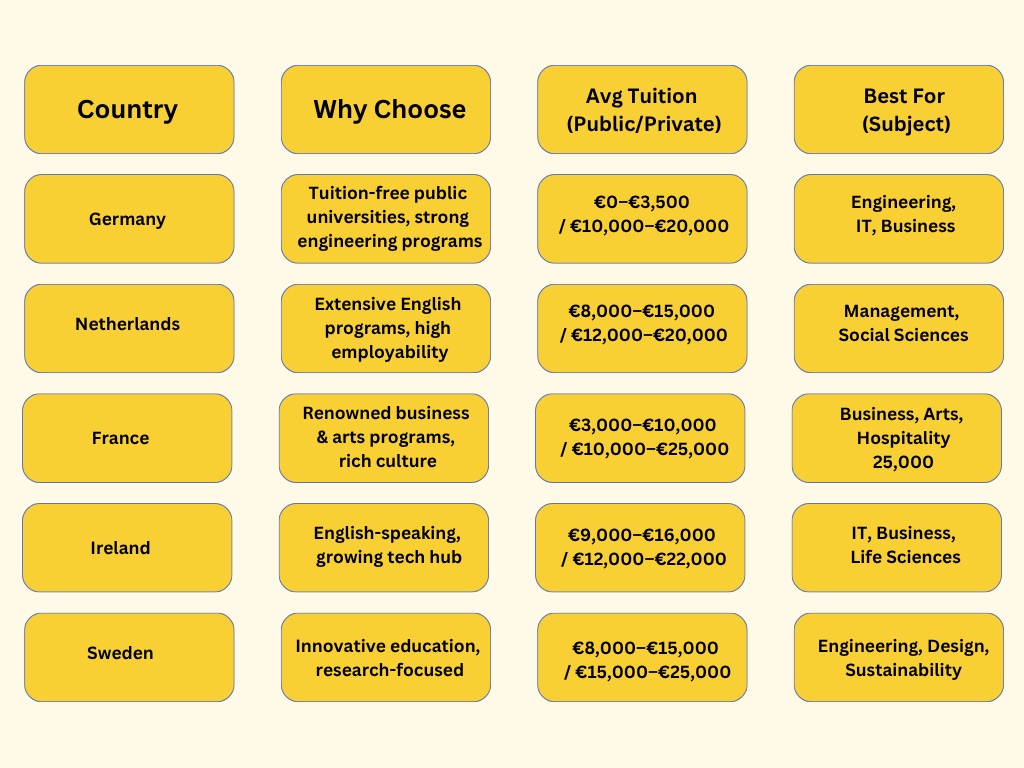
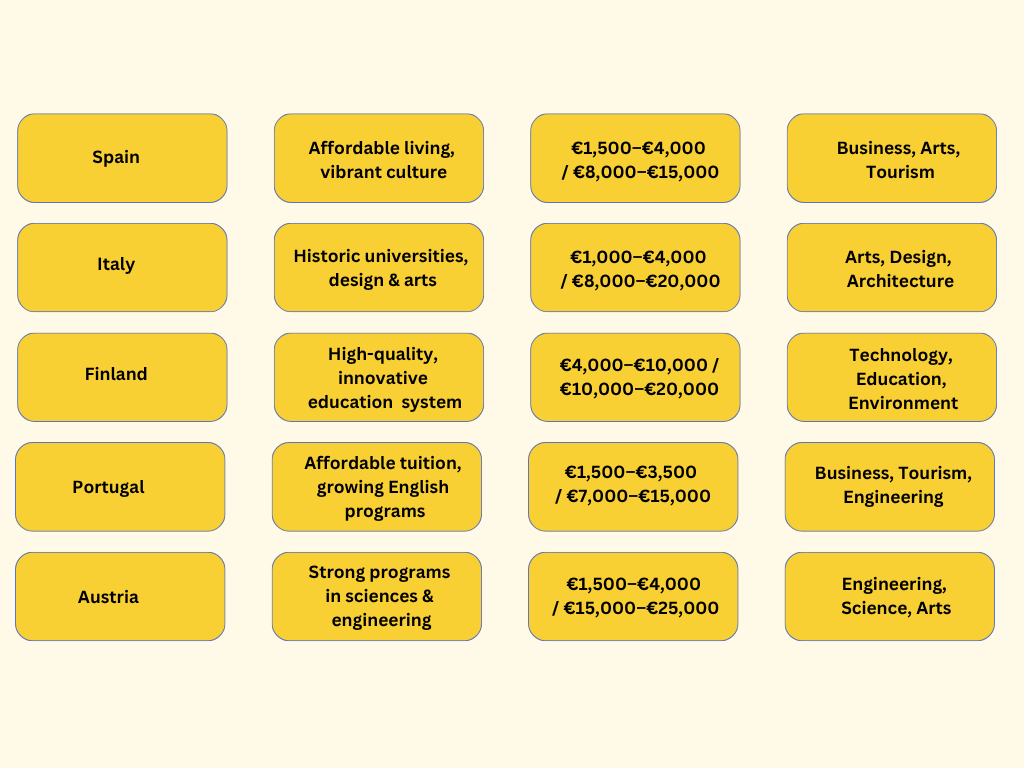
With affordable tuition, strong post-study work options, and diverse programs, these countries represent the Best Countries to Study in Europe in 2026.
Genius Study Abroad helps Indian students navigate these options to make the right choice for their education and career growth.
How We Chose These Countries
Selecting the Best Countries to Study in Europe required a careful evaluation of multiple factors to ensure Indian students get the best value and career opportunities.
We considered tuition and living costs, the number of English-taught programs, and the overall quality of universities using insights from QS World University Rankings, Times Higher Education (THE), and official country education guides.
We also looked at scholarship availability, post-study work and PR pathways, and employability prospects for graduates. Countries offering a strong balance between affordability, international exposure, and career growth naturally made the list.
By combining global rankings, country-specific data, and student-focused criteria, this selection provides a reliable guide for Indian students seeking quality education in Europe with meaningful work opportunities.
Genius Study Abroad uses these insights to help students make informed, strategic choices for their higher studies abroad.
Top 10 countries
Germany
Germany remains a top destination for international students, particularly from India, due to its high-quality education system, low or no tuition fees at public universities, and strong industry connections.
Top Universities:
- Technical University of Munich (TUM)
- Ludwig Maximilian University of Munich (LMU)
- RWTH Aachen University
Average Tuition & Living Costs:
Public universities charge minimal or no tuition fees; private institutions range from €10,000–€20,000 per year. Living costs average €850–€1,200 per month.
Language & English Program Availability:
Most master’s programs are offered in English, especially in STEM fields. Bachelor’s programs may require proficiency in German.
Post-Study Work & PR Pathway:
Graduates can apply for an 18-month job-seeking visa. Permanent residency is possible after 2–3 years of employment.
Scholarships & Funding:
Options include DAAD scholarships, university-specific grants, and industry-funded programs.
Best For:
Engineering, IT, automotive, business, and research-oriented fields.
Netherlands
The Netherlands is known for its extensive English-taught programs and high employability rates, making it a preferred choice for international students.
Top Universities:
- University of Amsterdam
- Delft University of Technology
- Erasmus University Rotterdam
Average Tuition & Living Costs:
Tuition fees range from €8,000–€15,000 per year. Living costs average €900–€1,200 per month.
Language & English Program Availability:
Most programs, especially at the master’s level, are offered in English.
Post-Study Work & PR Pathway:
Graduates can apply for a 12-month orientation year to find employment. Long-term residence is possible with employment.
Scholarships & Funding:
Available through the Holland Scholarship, university grants, and sector-specific scholarships.
Best For:
Business, IT, engineering, social sciences, and creative arts.
France
France offers world-class master’s programs with affordable public tuition, especially at public institutions, and a growing number of English-taught programs.
Top Universities:
- Sorbonne University
- École Normale Supérieure (ENS)
- University of Paris-Saclay
Average Tuition & Living Costs:
Public university tuition is approximately €3,000 per year; private institutions may charge higher fees. Living costs average €800–€1,200 per month.
Language & English Program Availability:
Many master’s programs are offered in English, particularly in business and engineering.
Post-Study Work & PR Pathway:
Graduates can apply for a temporary residence permit to seek employment. Long-term residence is possible with employment.
Scholarships & Funding:
Options include Eiffel Excellence Scholarships and university-specific grants.
Best For:
Business, arts, humanities, and social sciences.
Ireland
Ireland is an English-speaking country with strong tech and corporate hiring, offering attractive post-study work routes for international students.
Top Universities:
- Trinity College Dublin
- University College Dublin (UCD)
- University College Cork (UCC)
Average Tuition & Living Costs:
Tuition fees range from €9,000–€16,000 per year. Living costs average €1,000–€1,500 per month.
Language & English Program Availability:
All programs are offered in English.
Post-Study Work & PR Pathway:
Graduates can apply for a 24-month stay-back visa. Permanent residency is possible after 5 years of employment.
Scholarships & Funding:
Available through the Government of Ireland Scholarships and university-specific grants.
Best For:
IT, business, life sciences, and engineering
Sweden
Sweden offers high-quality education with good scholarships for international students, though recent policy changes may affect tuition fees.
Top Universities:
- Lund University
- Karolinska Institute
- Uppsala University
Average Tuition & Living Costs:
Tuition fees for non-EU students range from €8,000–€15,000 per year. Living costs average €1,000–€1,200 per month.
Language & English Program Availability:
Many programs, especially at the master’s level, are offered in English.
Post-Study Work & PR Pathway:
Graduates can apply for a 12-month work permit. Permanent residency is possible after 4 years of employment.
Scholarships & Funding:
Available through the Swedish Institute Scholarships and university-specific grants.
Best For:
Engineering, design, sustainability, and life sciences.
Finland
Finland is known for its high-quality education system and offers good scholarships for international students.
Top Universities:
- University of Helsinki
- Aalto University
- University of Turku
Average Tuition & Living Costs:
Tuition fees for non-EU students range from €10,000–€18,000 per year. Living costs average €700–€1,000 per month.
Language & English Program Availability:
Many programs, especially at the master’s level, are offered in English.
Post-Study Work & PR Pathway:
Graduates can apply for a 1-year job-seeking visa. Permanent residency is possible after 4 years of employment.
Scholarships & Funding:
Available through the Finnish Government Scholarship Pool and university-specific grants.
Best For:
Technology, education, and environmental sciences.
Spain
Spain offers affordable education with a rich cultural experience, making it an attractive destination for international students.
Top Universities:
- University of Barcelona
- Autonomous University of Madrid
- University of Valencia
Average Tuition & Living Costs:
Tuition fees range from €1,500–€4,000 per year. Living costs average €800–€1,200 per month.
Language & English Program Availability:
Many programs are offered in Spanish; however, the number of English-taught programs is increasing.
Post-Study Work & PR Pathway:
Graduates can apply for a 1-year job-seeking visa. Permanent residency is possible after 10 years of residence.
Scholarships & Funding:
Available through the Spanish Government Scholarships and university-specific grants.
Best For:
Business, arts, and tourism.
Italy
Italy offers affordable education with a rich cultural heritage, making it an attractive destination for international students.
Top Universities:
- University of Bologna
- University of Milan
- Sapienza University of Rome
Average Tuition & Living Costs:
Tuition fees range from €1,000–€4,000 per year. Living costs average €800–€1,200 per month.
Language & English Program Availability:
Many programs are offered in Italian; however, the number of English-taught programs is increasing.
Post-Study Work & PR Pathway:
Graduates can apply for a 1-year job-seeking visa. Permanent residency is possible after 10 years of residence.
Scholarships & Funding:
Available through the Italian Government Scholarships and university-specific grants.
Best For:
Arts, design, and humanities.
Portugal
Portugal offers affordable education with a growing number of English-taught programs, making it an attractive destination for international students.
Top Universities:
- University of Porto
- University of Lisbon
- University of Coimbra
Average Tuition & Living Costs:
Tuition fees range from €1,500–€3,500 per year. Living costs average €700–€1,000 per month.
Language & English Program Availability:
Many programs are offered in Portuguese; however, the number of English-taught programs is increasing.
Post-Study Work & PR Pathway:
Graduates can apply for a 1-year job-seeking visa. Permanent residency is possible after 5 years of residence.
Scholarships & Funding:
Available through the Portuguese Government Scholarships and university-specific grants.
Best For:
Business, tourism, and engineering.
Austria
Austria offers affordable education with a high standard of living, making it an attractive destination for international students.
Top Universities:
- University of Vienna
- Vienna University of Technology
- University of Innsbruck
Average Tuition & Living Costs:
Tuition fees range from €1,500–€4,000 per year. Living costs average €900–€1,200 per month.
Language & English Program Availability:
Many programs are offered in German; however, the number of English-taught programs is increasing.
Post-Study Work & PR Pathway:
Graduates can apply for a 1-year job-seeking visa. Permanent residency is possible after 5 years of residence.
Scholarships & Funding:
Available through the Austrian Government Scholarships and university-specific grants.
Best For:
Engineering, science, and arts.
Read More : Study in Europe 2026: Top Universities, Courses & Scholarships
Tuition, Cost of Living & Realistic Budgets for Indian Students
When planning to study in Europe, understanding tuition fees, living costs, and budgeting realistically is essential for Indian students.
Tuition varies significantly depending on the country and type of university. Public universities in countries like Germany, Finland, and Austria often charge minimal fees, ranging from €0–€4,000 per year, while private universities or specialized programs in the Netherlands, France, or Italy can cost €10,000–€25,000 per year.
Living costs also depend on location. In major cities such as Amsterdam, Paris, or Munich, students can expect €900–€1,500 per month, covering accommodation, food, transport, and personal expenses.
Smaller towns and university cities often offer more affordable options, averaging €700–€1,000 per month. For example, a student in Munich might budget €1,300 monthly, while in a city like Leipzig, €850 monthly can be sufficient.
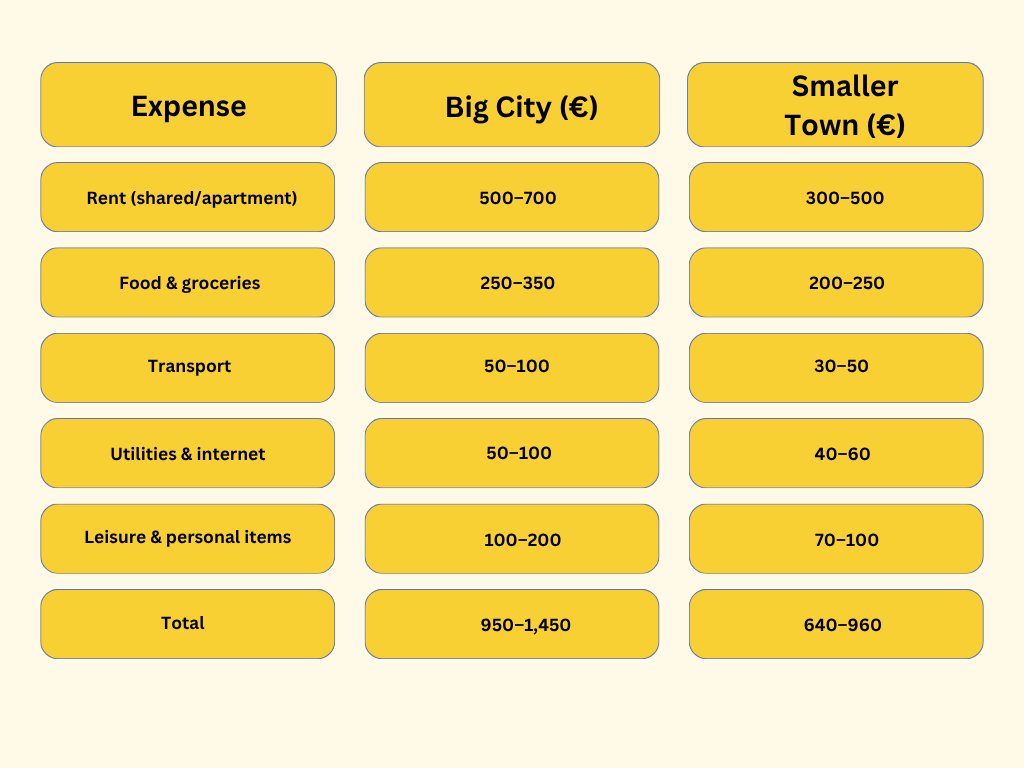
Tips on Saving:
- Part-time work: Most European countries allow Indian students to work 20 hours/week during term and full-time during vacations, helping cover some expenses.
- Student discounts: Universities, transport services, and cultural attractions often provide significant student discounts.
- Housing hacks: Sharing apartments, living in university dorms, or opting for smaller towns can drastically reduce costs.
- Budgeting apps & meal planning: Tracking expenses and cooking at home saves hundreds per month.
With careful planning, Indian students can balance quality education with manageable expenses.
Genius Study Abroad guides students on budgeting, scholarships, and cost-saving strategies to make studying in Europe a financially viable and rewarding experience.
Read More : Top 10 Toughest Exams in the World 2025
Post-Study Work & Career Pathways (PSW) in Europe
Europe offers attractive post-study work (PSW) opportunities, allowing Indian students to gain international experience and explore career pathways. Here’s a comparison of popular study destinations:
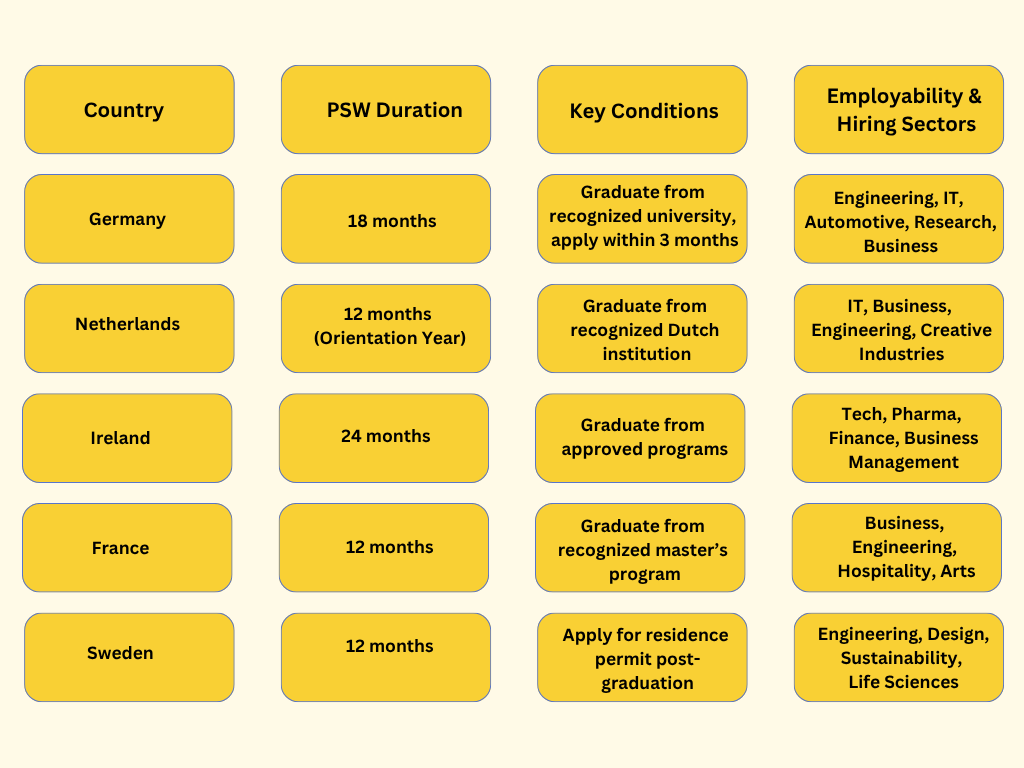
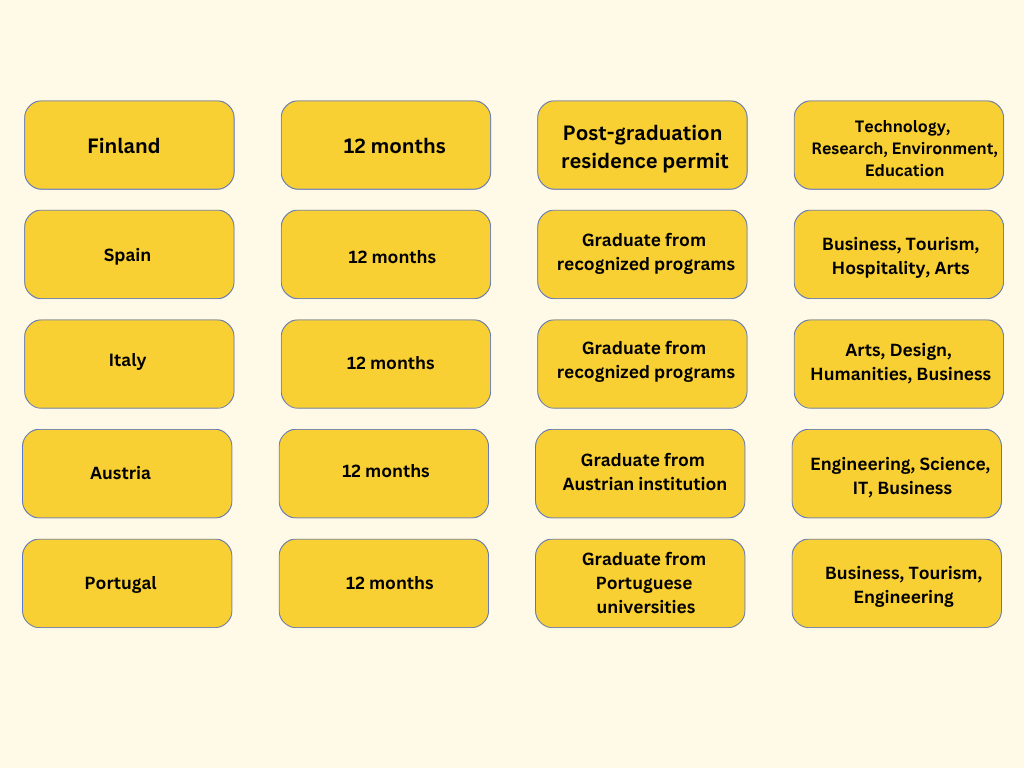
These PSW programs allow Indian students to gain practical experience, improve employability, and, in some countries, pave the way for permanent residency.
With guidance from Genius Study Abroad, students can select countries that align with their career goals.
Scholarships & Funding for Indian Students
Studying in Europe can be affordable with the right scholarships. Opportunities come from government programs, universities, and external foundations.
Key Sources:
- Government Scholarships: DAAD (Germany), Erasmus+ (EU-wide), Swedish Institute, Irish Government Scholarships, Eiffel Excellence (France).
- University-Specific Scholarships: Merit-based awards, need-based grants, tuition waivers, e.g., University of Amsterdam Excellence Scholarships, Trinity College Global Excellence.
- External Foundations & Country Schemes: Rotary Foundation, Fulbright, Santander International Grants, and country-specific schemes like Italy’s Invest Your Talent or Portugal’s Science & Technology Foundation awards.
Application Tips:
- Start 6–12 months in advance of program start.
- SOP/Personal Statement: Focus on academic achievements, career goals, and alignment with program.
- Documentation: Academic transcripts, recommendation letters, financial proof, passport, and language test scores.
- Track deadlines and scholarship-specific requirements carefully.
Applying systematically and early increases chances of receiving funding and easing financial pressures while studying in Europe.
Visa Checklist & Common Reasons for Refusal
Securing a student visa is crucial, and understanding common pitfalls helps avoid rejection.
Essential Documents:
- Valid passport
- Admission letter from recognized university
- Proof of funds (bank statements, scholarships)
- Academic transcripts & degree certificates
- Language proficiency proof (IELTS/TOEFL, if required)
- Passport-size photographs
Key Considerations:
- Genuine Student Intent (GTE): Clearly explain why you chose the program, how it aligns with career goals, and ties to your home country.
- Health & Character Checks: Complete mandatory medical exams and police clearance certificates.
- Consistency in Documentation: Avoid missing or mismatched documents.
Common Pitfalls:
- Insufficient or unclear proof of funds
- Weak SOP or inconsistent academic/career plan
- Expired or incomplete documents
- Prior visa refusals not explained
Actionable Checklist:
✅ Prepare all documents in advance
✅ Draft a strong, authentic SOP
✅ Maintain financial transparency
✅ Follow application timelines
✅ Double-check medical and character clearances
With Genius Study Abroad, Indian students can navigate visa applications confidently, reducing the risk of refusal and ensuring a smooth start to their European education journey.
Read More : Best Consultancy in India for Abroad Studies | Top Study Abroad Experts 2025
Admissions & Application Timeline for 2026 Intake
Planning early is key for Indian students aiming to study in Europe in 2026. Start with research on courses, universities, and countries by mid-2025 to identify options aligned with your career goals.
For programs requiring language proficiency or standardized tests (IELTS, TOEFL, GRE, GMAT), register and complete exams by August–September 2025 to allow sufficient time for applications.
Most master’s programs in Europe start in September/October, while some universities also offer January/February intakes. Undergraduate programs often begin in September.
Applications should ideally be submitted 3–6 months prior to the intake to secure admission and visa processing time.
Scholarship applications, like DAAD, Erasmus+, or university-specific merit awards, usually close between November 2025 and March 2026, so keep deadlines in mind.
After receiving admission offers, begin the student visa process immediately, as it can take 6–12 weeks depending on the country.
Genius Study Abroad helps Indian students map this entire timeline, ensuring all steps—from research to visa—are completed efficiently.
Course & University Selection Tips for Indian Students
Choosing the right course and university is critical for long-term success. Start by matching courses to your academic background and career goals; for example, engineering graduates can target STEM master’s programs in Germany or Sweden.
Check language requirements, as some bachelor’s programs may require local language proficiency, while most master’s programs are offered in English.
Evaluate industry links, internships, and employability outcomes of your target universities. Alumni networks and placement records provide insights into post-study opportunities.
Consider program flexibility, duration, and opportunities for research or hands-on experience.
Additionally, check university rankings, student satisfaction, and campus resources.
European universities in countries like Ireland, the Netherlands, and Germany often combine strong academics with excellent career support.
With guidance from Genius Study Abroad, Indian students can shortlist programs strategically, ensuring academic fit, career potential, and financial feasibility.
Student Life & Cultural Tips
Student life in Europe varies by country and city, but some basics apply to Indian students. Housing can be university dorms, private apartments, or shared flats; booking early ensures lower rent.
Health insurance is mandatory in most countries and often included in university plans.
Social integration matters: participate in clubs, societies, and community events to build networks and adapt to local culture.
Be aware of local etiquette, such as punctuality, communication styles, and dining customs. Many countries allow students to bring family members on dependent visas, though regulations differ.
Additionally, familiarize yourself with student visa conditions like part-time work limits, travel rules, and registration requirements. Following these guidelines ensures a smooth academic and social experience.
Alternatives & Niche Picks
While top destinations attract the most students, smaller emerging countries offer affordable, high-quality education.
Poland, Czech Republic, Malta, and Lithuania are increasingly popular due to lower tuition fees, moderate living costs, and growing English-taught programs.
These destinations are excellent for fields like engineering, IT, hospitality, and arts, providing more personalized attention and opportunities to explore European culture without the high expenses of larger countries.
Genius Study Abroad helps Indian students discover these niche opportunities and make informed decisions beyond traditional destinations.
Read More : Top 5 Study Abroad Consultants in Delhi
Conclusion
Europe continues to be one of the Best Countries to Study in Europe for Indian students in 2026, offering world-class education, affordable tuition, diverse English-taught programs, and strong post-study work opportunities.
By carefully evaluating tuition, living costs, university rankings, and career prospects, students can make informed choices for their higher education journey.
To take actionable steps: shortlist 2–3 countries that align with your goals, shortlist 4–6 universities based on programs, rankings, and employability, prepare your documents and SOP, apply for scholarships, and book a counseling call with Genius Study Abroad to get expert guidance.
Following these steps will ensure a smooth application process and set you on the path to a successful international education experience.
Contact No : 70 335 335 70
FAQs
1. What are the best countries to study in Europe for Indian students in 2026?
Germany, Netherlands, France, Ireland, Sweden, Spain, Italy, Finland, Portugal, and Austria — chosen for affordability, quality education, English programs, and post-study work opportunities.
2. Is it cheaper to study in Europe than the USA or UK?
Often yes — public universities and subsidized tuition make many EU options more affordable, with living costs also lower in smaller cities.
3. Can I work part-time as a student in Europe?
Yes, most countries allow 20 hours/week during term and full-time during vacations.
4. Are scholarships available for Indian students?
Yes, via government programs (DAAD, Erasmus+), universities, and private foundations.
5. Which fields have high employability?
STEM, IT, Business, Hospitality, Arts, and Engineering are top sectors for international hires.
6. Can I bring my family while studying in Europe?
Some countries allow dependent visas — rules vary; always check country-specific regulations.
7. Do I need health insurance?
Yes, it is mandatory in almost all European countries for international students.
8. How do I choose the right university?
Match your course to your background, check language requirements, internship/industry links, and alumni outcomes.



